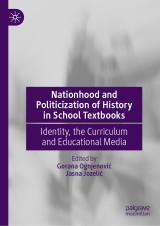Details

Nationhood and Politicization of History in School Textbooks
Identity, the Curriculum and Educational Media|
96,29 € |
|
| Verlag: | Palgrave Macmillan |
| Format: | |
| Veröffentl.: | 15.02.2020 |
| ISBN/EAN: | 9783030381219 |
| Sprache: | englisch |
Dieses eBook enthält ein Wasserzeichen.
Beschreibungen
<div>This book explores how school history textbooks are used to perpetuate nationalistic policies within divided regions. Exploring the ‘divide and rule’ politics across ex-Yugoslav successor states, the editors and contributors draw upon a wide range of case studies from across the region. Textbooks and other educational media provide the foundations upon which the new generation build understanding about their own context and the events that are creating their present. By promoting nationalistic politics in such media, textbooks themselves can be used as tools to further promote and preserve ongoing hostility between ethnic groups following periods of conflict. This edited collection will appeal to scholars of educational media, history education and post-conflict societies. <br></div>
Foreword: Sarajevo in the twentieth century, or, the manufacture of European history; Anne Madelain.- Chapter 1. Nationhood and the politicization of history in school textbooks; Gorana Ognjenović and Jasna Jozelić.- Chapter 2. The ideologization of history education and textbooks in Slovenia (Yugoslavia) during socialism, 1945-1990; Mateja Režek.- Chapter 3. Ideological changes in the history textbooks of Montenegro; Saša Knežević and Nebojša Čagorović.- Chapter 4. Kosova under Yugoslavia (1945-1999) in the history textbooks of Kosova and Serbia; Shkëlzen Gashi.- Chapter 5. History, identity and curricula: Public debates and controversies over the proposal for a new history curriculum in Croatia; Snježana Koren.- Chapter 6. Phantoms of Neverland: The tale of three+ history textbooks; Gorana Ognjenović.- Chapter 7. Where and how do pupils in Serbia learn about the 1990s Yugoslav wars?; Marko Šuica, Ana Radaković, and Slobodan Rudić.- Chapter 8. To believe or not to believe: Current history textbooks in Bosnia and Herzegovina; Goran Šimić.- Chapter 9. The most golden age: A discourse analysis of representations of medieval Bosnia in secondary school history textbooks in the Federation of BiH; Sead S. Fetahagić.- Chapter 10. Teaching history with an ethno-nationalistic approach: History textbooks in the education system of Bosnia and Herzegovina; Jasna Jozelić.- Chapter 11. The myth of victimization in Macedonian history textbooks (1991-2018); Darko Leitner Stojanov and Petar Stojanov.- Chapter 12. Southeast Europe in history textbooks: A variety of selective perceptions; Zrinka Štimac.- Chapter 13. Afterword; Sabine Rutar.
<div><b>Gorana </b><b>Ognjenović </b>is Research Fellow at the University of Oslo, Norway. <br></div><div><br></div><div><b>Jasna </b><b>Jozelić </b>is a PhD candidate at the Norwegian Centre for Human Rights, Norway. </div>
"This book offers a comprehensive and thoroughly researched analysis of politicization of history in school textbooks in South-East Europe. It successfully combines primary empirical research with valuable theoretical insights and in this way provides a unique comparative look at new states that have emerged after the break-up of the Yugoslav federation."<div>—<b>Siniša Malešević</b>, University College Dublin, Ireland</div><div><br></div><div>"This book is not only necessary readings for student in South East Europe after the break-up of Yugoslav federation, it also offers important insights about the rise of populism and nationalism in various parts of the world. Anyone who is interested in countries that are perpetually in a state of “frozen conflict” can learn much about the cultural and social mechanisms behind conflict, and develop pro-active methods of protecting human rights by reading this insightful and thoroughly researched book."</div><div>—<b>Idil Eser</b>, Former General Secretary of AI Turkey</div><div> <br>This book explores how school history textbooks are used to perpetuate nationalistic policies within divided regions. Exploring the ‘divide and rule’ politics across ex-Yugoslav successor states, the editors and contributors draw upon a wide range of case studies from across the region. Textbooks and other educational media provide the foundations upon which the new generation build understanding about their own context and the events that are creating their present. By promoting nationalistic politics in such media, textbooks themselves can be used as tools to further promote and preserve ongoing hostility between ethnic groups following periods of conflict. This edited collection will appeal to scholars of educational media, history education and post-conflict societies. <br></div><div><div><div><b><br></b></div><div><b>Gorana </b><b>Ognjenović </b>is Research Fellow at the University of Oslo, Norway. <br></div><div><br></div><div><b>Jasna </b><b>Jozelić </b>is a PhD candidate at the Norwegian Centre for Human Rights, Norway. </div></div></div>
<p>Explores how school history textbooks can be used to further nationalistic aims within divided regions</p><p>Analyses a wide range of case studies from across the ex-Yugoslav successor states</p><p>Examines how textbooks can capture and further existing hostilities between ethnic groups</p>
<p><br></p>
Diese Produkte könnten Sie auch interessieren:

Community Schools in Africa

von: Deborah Glassman, Chloe O'Gara, Kristin Helmore, Jordan Naidoo, Fred Wood

53,49 €















